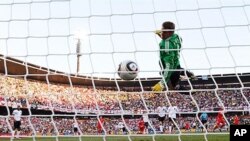Several questionable calls at the World Cup, football's premier event, have brought renewed cries by many for the use of video replays in certain situations.
Nearly everywhere you turn in South Africa people are weighing in on the injustice to England and its midfielder Frank Lampard who appeared to score a goal to tie Germany at 2-2 just before half in their second-round elimination match.
The problem is, just about everyone but the game referee and linesman knew the ball clearly crossed the goal line so, inexplicably, it did not count. It also changed the nature of the match and Germany went on to win, 4-1, handing England its worst-ever World Cup defeat.
Ironically, it was the Germans who fell victim to England in a goal line controversy at a previous World Cup. In the 1966 final between England and West Germany, England's Geoff Hurst was awarded the go-ahead goal when the ball struck the bar and landed on the line. The Germans still say it never completely crossed the line, but the referee ruled it did and England went on to win, 4-2.
Football's world governing body, has explored the use video replays, primarily for whether balls have completely crossed the goal line. But FIFA has refused to implement a technology that so many other sports – including baseball, ice hockey, basketball and American football – have acknowledged are needed, and thus have instituted, to get important calls right.
|
|
South African videographer Byron Blunt says the use of video replay in his country is called "the third umpire," and he is strongly in favor of it.
"The third umpire has to be introduced into football, the same way that it is in rugby and in cricket, in sport games that I know, because there is margin for error," Blunt said. "I am not saying bring the third umpire (video cameras) in for little silly fouls, no. Some people say do not bring the third umpire in. Some people say do not bring the third umpire in because it is going to stop the football match. The thing is, this is not absolutely correct. The third umpire needs to be brought in so people are not robbed."
Blunt added it is time for FIFA to join the modern world.
"As we saw in the replay between England and Germany, the ball went over the line, and it would have been 2-2. That could have changed the dynamic of the game. So therefore, we need to change that rule, and if FIFA can not accept that, then they must be challenged," he said.
A passionate English fan from Birmingham, Trish Malone, fully supports implementing so-called goal-line technology into football.
"I think it is acceptable nowadays. We absolutely have to have video replay," said Malone. "It should not and will not hold [up] the game. If you can have it in tennis and in cricket, which are very fundamentally English games, traditional games and it does not upset the flow of the game, we absolutely should have it here. So I think opinion now should entirely be swayed towards moving towards this for the next World Cup or for the European Championships or major international games. I think it is absolutely vital now."
England's Italian coach, Fabio Capello, said he is amazed that football has yet to fall into line with many other sports that are using video replays to assist officials. He said, "It is incredible that in a time of technology, the referees are not capable of deciding if there has been a goal or not." England football captain Steven Gerrard also called on FIFA to look into goal-line technology.
Besides FIFA, there are still a number of football purists who do not want to see technology be a part of the game. Welsh Football Association chief executive Jonathan Ford is one of them. He says referees need all the help they can be given to improve decision-making, but he is not sure that technology is the way to do it.
American Jerry Dickinson, from Pittsburgh, believes it is. He played four years of college soccer at Holy Cross (in Massachusetts). He has been to several World Cup games, and is aware that FIFA president Sepp Blatter attended the England-Germany match, witnessed the injustice and heard the angry English fans. Dickinson hopes the backlash will lead Blatter to make sure that the outcome of important games are not in dispute.
"That involves technology, whether or not we like it or not. You know everyone sees it through video replay," Dickinson said. "Technology has to be implemented. So Sepp Blatter, the head of the FIFA federation, I mean I am almost positive he is rethinking this through his head right now. He needs to implement it."
During a match at the Wimbledon tennis championships the day after England's football team was denied the goal against Germany, American Venus Williams used one of her video replay challenges on a linesman call that went against her. The replay reversed the call and gave Williams the point. The TV announcer said it was thanks to technology and added, "Are you watching Sepp Blatter?"
The bottom line is that until video replays are used in football, the world's most popular sport, athletes and teams will continue to be victims of incorrect and unfair calls.




